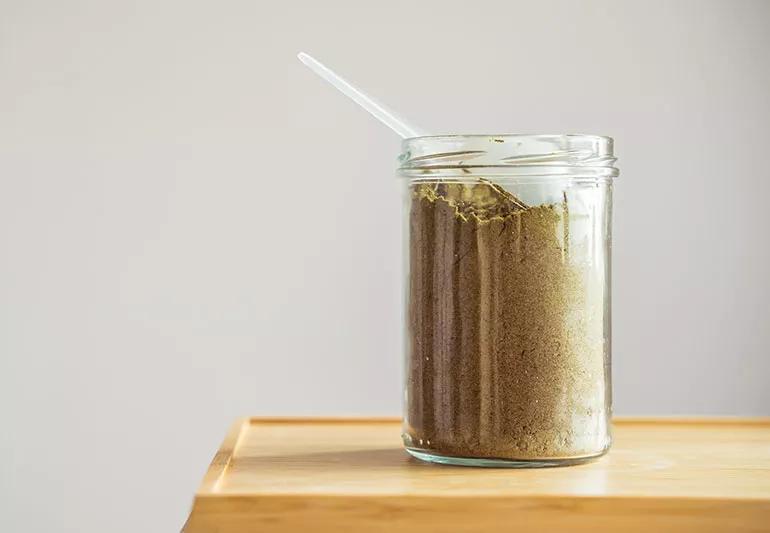This overlooked source packs a healthy punch

If you’re in the market for a healthy protein powder, you may be overlooking one of the best options available: hemp. Yes, hemp is a powerful plant-based source of protein and fiber, a terrific potential supplement for your diet that doesn’t receive as much attention because of a misconception.
Advertisement
Cleveland Clinic is a non-profit academic medical center. Advertising on our site helps support our mission. We do not endorse non-Cleveland Clinic products or services. Policy
“Hemp and marijuana both come from the cannabis plant, but hemp has very little tetrahydrocannabinol (THC), the chemical that causes marijuana’s psychedelic effect,” says registered dietitian Amanda Kusske, RD. That makes hemp perfectly safe to ingest without worrying about any adverse reaction.
In fact, hemp carries several benefits when used as a protein powder, as Kusske explains.
“Hemp protein is a vegan, plant-based protein powder that’s made from hemp plants,” says Kusske. “And one big advantage is that hemp protein doesn’t require nearly as much processing as other proteins.”
Other proteins, like soy, require several steps and an extraction process to form a usable protein powder, she points out. For hemp protein, though, it’s simply grinding hemp seeds into a fine powder.
According to Kusske, hemp is one of the few complete protein sources. “This means that it contains all nine essential amino acids that we need in our diet,” she says.
Additionally, it’s high in fiber with one serving — about four tablespoons — containing 11 grams of fiber, about one-third of the daily recommended amount for adults. It’s the only protein powder that packs such a fiber-heavy punch, Kusske notes.
Advertisement
Hemp fiber also contains omega-3 and omega-6 unsaturated fatty acids that are good for your heart health, as well as your immune system and digestion. Your body doesn’t produce these fats, so getting them in your diet is important. There’s also a good amount of nutrients like iron, magnesium and manganese, which, Kusske says, aren’t always found in protein powder.
And if you are vegan or vegetarian, it’s a perfect fit as a completely plant-based protein source. That’s especially important, as many vegans and vegetarians don’t always get the necessary amount of protein due to a lack of animal protein in their diet.
However you decide to add it to your diet, though, Kusske reminds us that no protein powder should be your only source of protein “It’s important to get as much variety in our diet as we can,” she says, “but for boosting your protein intake a bit, it can be a good addition to your diet.”
Unless you’re allergic to hemp, Kusske says there aren’t any risks. Just be sure that hemp protein is used as a supplement, not a replacement for anything in your diet.
While there aren’t any real risks to hemp protein, that doesn’t mean there aren’t any side effects. For one, that big dose of fiber could have an effect, especially if you’re not used to eating a lot of fiber.
“In that situation, it could cause some gas, bloating and a bit of digestive distress,” explains Kusske, “so it’s best to start in small amounts and gradually build up.”
And, as always, it’s best to consult your healthcare provider first, as they’re best suited to help you make any planned changes to your diet based on your specific situation.
Advertisement
Learn more about our editorial process.
Advertisement

The tropical fruit is a good source of antioxidants and vitamin C

High amounts of cholesterol and saturated fat in red meat may be linked to heart disease

The leaves and pods from this tree are rich in essential nutrients

This starchy root vegetable is a staple in many global cuisines — but it has to be prepared correctly, or it can cause serious concerns

These delicate green sprouts can give you an extra dose of vitamin K and other nutrients — but they’re not safe for everyone

Edamame, lentils and chicken breast are good sources of protein

Eating this root vegetable can help support your eye, heart and brain health

The flavorful herb is full of antioxidants that may help regulate blood sugar

Wearing a scarf, adjusting your outdoor activities and following your asthma treatment plan can help limit breathing problems

Your diet in the weeks, days and hours ahead of your race can power you to the finish line

When someone guilt trips you, they’re using emotionally manipulative behavior to try to get you to act a certain way